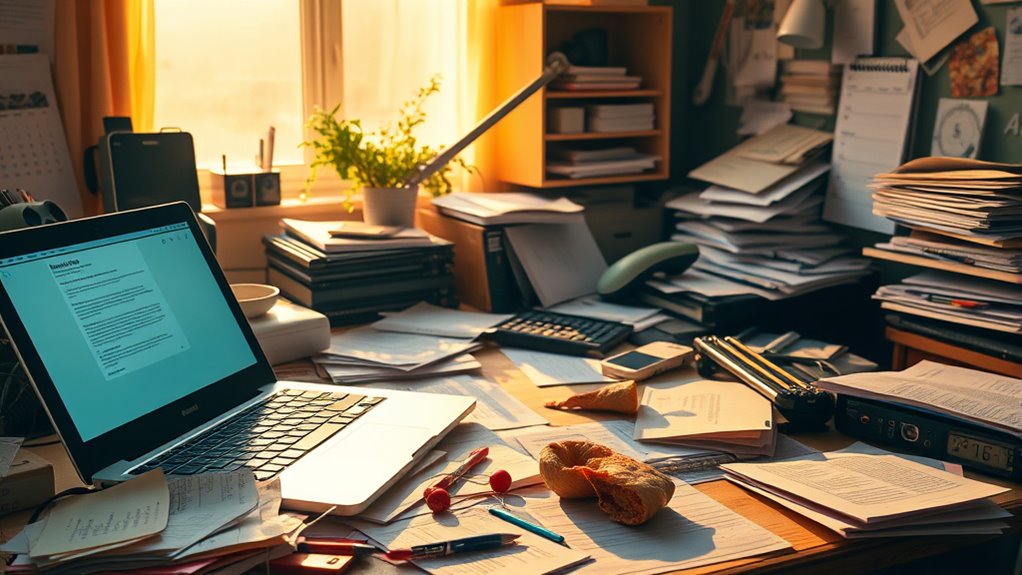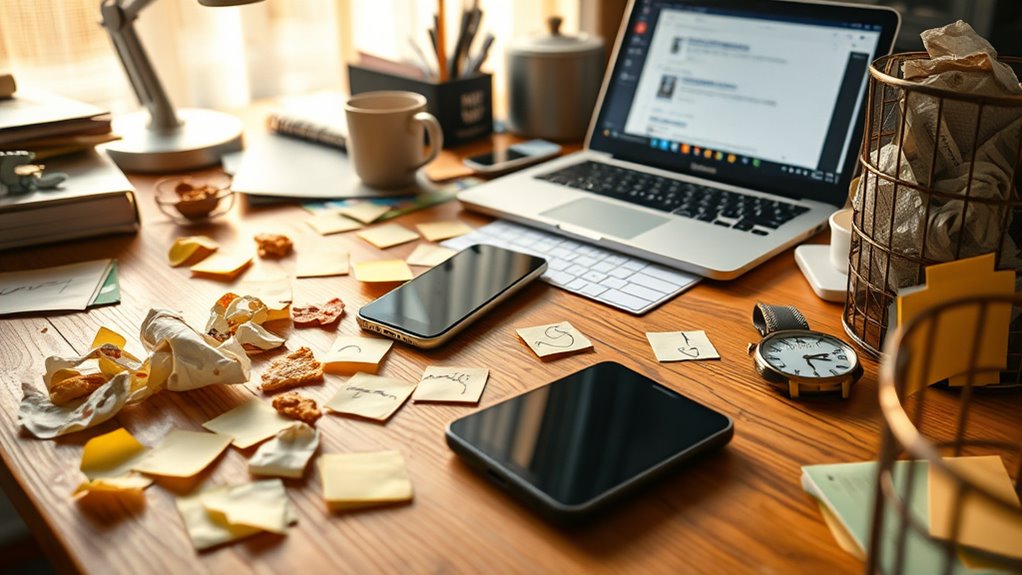To quickly neutralize procrastination triggers, start by identifying what causes you to delay—such as cluttered spaces, distractions, or negative mindsets. When you notice these cues, pause and make immediate adjustments like tidying up your environment, turning off notifications, or reframing your thoughts. Recognizing your habits helps you control them more effectively. To discover more effective strategies and fine-tune your approach, explore additional tips that can keep you on track.
Key Takeaways
- Increase awareness of personal triggers by reflecting on moments of delay and noting environmental or emotional cues.
- Use immediate environmental adjustments, like tidying or silencing distractions, to quickly neutralize triggers.
- Reframe negative thoughts about tasks to reduce avoidance and build motivation to start promptly.
- Break tasks into smaller steps to lessen overwhelm and diminish triggers related to procrastination.
- Implement visual or physical cues, such as checklists or timers, to prompt action and reinforce positive habits quickly.

Have you ever wondered what causes you to put things off until the last minute? It often boils down to the subtle ways your mindset and environment influence your behavior. Recognizing and addressing these triggers can help you break free from procrastination. One of the most effective strategies involves mindset shifts. When you change how you think about tasks, you create a mental foundation that encourages action rather than avoidance. Instead of viewing a task as an overwhelming chore, reframe it as an opportunity to grow or accomplish something meaningful. This mental shift makes it easier to start because you no longer see the task as a burden but as a step toward your goals. Developing a growth mindset—believing that skills and abilities can improve with effort—can also diminish the fear of failure that often leads to procrastination. When you see setbacks as learning opportunities rather than obstacles, you’re more inclined to take action without hesitation.
Environmental cues play an *indispensable* role in triggering procrastination. Your surroundings often subtly influence your behavior, either encouraging productivity or fostering distraction. Cluttered, noisy, or disorganized spaces can make it harder to focus and delay starting a task. Conversely, a clean, organized environment signals that it’s time to work and helps you concentrate. Small environmental adjustments can have a big impact. For example, turning off notifications on your devices reduces interruptions and keeps your mind focused on the task at hand. Setting up a dedicated workspace free of distractions creates a physical cue that signals, “Now is the time to work.” Additionally, visual cues like a checklist or a timer can prompt you to begin and maintain momentum. These cues serve as reminders that reinforce your commitment to completing tasks and help you stay on track. Understanding how your mindset and environment interact, especially through behavioral triggers, enables you to neutralize procrastination triggers swiftly. When you notice a tendency to delay, pause and ask yourself what mindset shifts might help—perhaps reframe your perspective or remind yourself of your capabilities. Simultaneously, assess your surroundings: Is there anything you can change immediately, like tidying your space or silencing your phone? By actively managing these triggers, you take control of your habits and create an environment that supports productivity. Over time, these small but intentional shifts can transform your approach to tasks, making procrastination less tempting and more manageable. The key is to stay aware of what influences you and to make deliberate adjustments that foster a proactive mindset and a conducive environment.
Frequently Asked Questions
How Can I Prevent Procrastination in High-Stress Situations?
In high-stress situations, you can prevent procrastination by practicing stress management techniques like deep breathing or quick mindfulness exercises to stay focused. Use time blocking to break tasks into smaller, manageable chunks, which helps reduce overwhelm. Prioritize your most important tasks first, and set clear deadlines. This approach keeps you engaged, minimizes stress, and prevents you from delaying important work when pressure is high.
What Role Does Perfectionism Play in Procrastination Triggers?
Perfectionism pitfalls often lead you to delay tasks because you set impossibly high standards. When you aim for flawlessness, high standards stress builds, making you afraid of failure or mistakes. This fear can cause procrastination as you avoid starting or completing tasks. Recognize that perfectionism isn’t necessary for success, and embracing imperfection can reduce stress, helping you take action more confidently and finish tasks without undue delay.
Are There Specific Triggers Unique to Creative Tasks?
Did you know 60% of creatives face unique triggers? When tackling creative tasks, you’re more prone to creative blocks and motivational dips, which can lead to procrastination. These triggers often stem from fear of judgment or perfectionism, making it harder to start or finish projects. Recognizing these specific triggers helps you neutralize them faster, so you can stay inspired and productive without getting stuck in a cycle of delay.
How Does Procrastination Affect Long-Term Goal Achievement?
Procrastination hampers your long-term goal achievement by delaying progress and weakening motivation strategies. When you put things off, you risk losing sight of your vision, making it harder to stay committed. It undermines your ability to plan effectively for the future. To stay on track, you need to recognize this pattern, reinforce your motivation strategies, and focus on consistent actions that align with your long-term planning efforts.
Can Procrastination Triggers Differ Between Individuals?
You might find that procrastination triggers differ between individuals because personal habits and emotional responses vary. For example, some people delay tasks due to fear of failure, while others do so because of perfectionism or boredom. Recognizing your unique triggers helps you develop tailored strategies to neutralize them effectively. By understanding how your habits and emotions influence your procrastination, you can take proactive steps to stay focused and productive.
Conclusion
By recognizing your triggers and acting quickly, you can break free from procrastination’s grip. Think of it like catching a small leak before it floods your entire house—address the issue early, and everything stays manageable. Remember, neutralizing triggers isn’t about perfection but progress. When you spot hesitation creeping in, take a deep breath, refocus, and tackle tasks head-on. Consistent effort transforms your workflow, turning procrastination into productivity. You’ve got this—start today!









